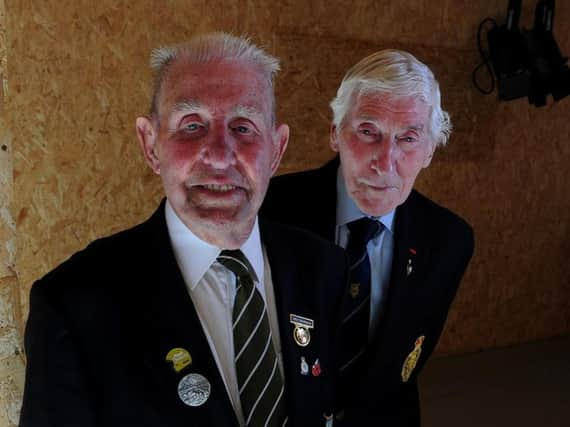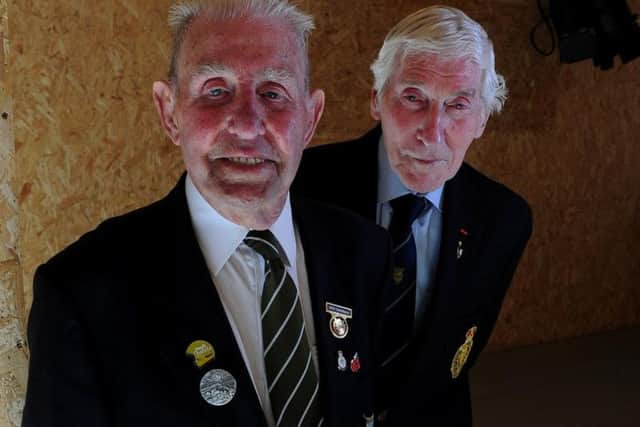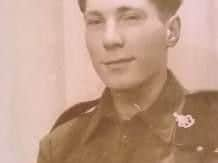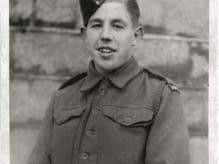York D-Day veterans: 'The real heroes are still in Normandy'


Ken Smith paused on the sand as one of the most daring and audacious military operations the world had ever seen unfolded around him. He had no choice.
In the grips of battle, amidst the noise and destruction of heavy bombing, the infantryman and signaller was under officer orders to dismantle a broken wireless set. In the receiver and in the battery were lodged two machine gun bullets.
Advertisement
Hide AdAdvertisement
Hide Ad“Before I landed, I wasn’t frightened, I wasn’t scared, I was terrified,” Ken recalls.


Advertisement
Hide AdAdvertisement
Hide Ad

He was 19 and part of the some 156,000 Allied troops that stormed the beaches of Normandy on June 6, 1944 for the D-Day offensive that marked the beginning of the end of the Second World War.
“I was absolutely terrified and shaking quite a bit. But when you get actually on the beach and resign yourself to the fact that you might not get through the day, that tends to disappear.”
Like many of the men, Ken, who grew up in Leeds, had travelled to the French coast by boat.
Advertisement
Hide AdAdvertisement
Hide Ad'When you're facing death, you grasp anything that could help'


As he lowered himself down a scrambling net to reach the landing craft that would take him to shore, he watched as soldiers lined up to be blessed in front of a priest’s table.
“They’re not the sort of men you can imagine that would have been in a church for many years. But when you’re facing death as you were, you tend to grasp anything that could help.
“There was this Cockney lad - boastful, small and swaggered about and he used to tell anyone that listened to him how he wasn’t frightened of anybody or anything.
Advertisement
Hide AdAdvertisement
Hide Ad“But just before we landed, I felt a hand on my shoulder - and I thought it was somebody telling me to pull myself together because I was shaking - and it was this little lad.
“He just said in this quite voice, all the bombasticness was gone, I’m scared mate. So I said we’ll look after each other. Going up the beach where mines had been cleared, or supposedly cleared, he went down.
“I saw him go and you’re not allowed to stop in battle. You have to keep going, so if anybody goes down you hesitate just for a minute and a voice behind you says keep going lad.
“That’s when I got to the top of the beach and the wireless set was no good...To my shame, I never found out what happened to him.”
Advertisement
Hide AdAdvertisement
Hide Ad'You're in a trench with someone and the next day he isn't there'
Ken, who had begun an apprenticeship as a draughtsman in engineering after leaving school, did his basic training in Derby after being conscripted.
He prepared for the D-Day invasion in Scotland and Cornwall and served with the Duke of Cornwall’s Light Infantry.
“You never really made friends,” he says, reflecting on the casualties and the turnover of troops. “They’d have you in a slit trench for two people. You’d be with somebody, you might know his first name and the next day he’s not there.”
Advertisement
Hide AdAdvertisement
Hide AdWhilst getting out of one such trench on October 20, 1944, Ken was hit by shrapnel as a shell burst nearby and killed a comrade.
He spent time in Brussels General Hospital before being flown home in a Dakota in November. He did five years of National Service with the Forces, including in Palestine.
'I took an oath to never handle another weapon again'
“When I came out the army, I was demobbed in York. I walked to the station and I called into the first church that I came across and I took an oath at the altar that I would not handle another weapon again and I’ve kept to that.
“I’ve not even bought my family toy guns. I won’t handle anything because over the five years, I have been responsible for the killing and wounding of quite a few.”
Advertisement
Hide AdAdvertisement
Hide AdNow aged 94 and living in York with wife Gloria, Ken, who had a career in the insurance industry, still gets flashbacks.
He survived but an estimated 10,000 Allied troops were either killed or injured on that harrowing day and tens of thousands more joined their ranks in the bitter struggle to loosen the grip of Nazi tyranny across Europe.
“You’ve seen such dreadful things,” Ken says. “The true heroes are still out there. That’s our thoughts completely.”
'We were sailing into noise, smoke and explosions'
It is a sentiment shared by fellow D-Day veteran Ken Cooke, then an infantryman with the Green Howards.
Advertisement
Hide AdAdvertisement
Hide AdHe had grown up in a mining village in Nottingham but, when his call up papers arrived at the end of 1943, was living in York and working at renowned confectionary company Rowntree’s, where he returned, and met his late wife Joan, after the conflict.
Ken’s ship bound for Normandy set sail from Southampton on the night of June 5.
An early wake up call came at 3.30am on D-Day morning when he and his comrades went to the mess deck for a breakfast of scotch porridge, and a corned beef sandwich, washed down with a mug of tea and a tot of rum for courage.
Half an hour later, they were told to get their gear together and make their way down the scramble nets into the landing craft.
Advertisement
Hide AdAdvertisement
Hide Ad“We set off towards the beach which we could hardly see because of the smoke.
“As we got closer, one or two of the chaps were seasick - I wasn’t. I seemed to be okay and I was leaning over the side of the landing craft watching all the fireworks and all the noise and smoke.
“It was terrible, noise, smoke, explosions and the way we were sailing towards the beaches, we were sailing into all that.”
'The bullets were real, the shells were real'
“To me as an 18-year-old it was like a boy scout adventure,” he adds. “It was all new - I’d never been on a ship before, never been on a beach before, never seen any big guns firing or whatever. It was all a big adventure.”
Advertisement
Hide AdAdvertisement
Hide AdThe ramp went down and the men jumped off into the sea. “I stepped into about six inches of water and my main feeling was oh my socks are all wet through. I weren’t bothered about the shells and bullets going.”
The men scrambled across the beach as quickly as they could, making way for more troops, tanks and masses of supplies following behind them. The danger didn’t sink in until the following morning.
“The day after D-Day, you realised some of your mates were missing. You wanted to know where they were and someone would say - oh they got killed yesterday.
“They got blown up and different things. That’s when it hit you that it was very, very serious. The bullets were real, the shells were real.”
Advertisement
Hide AdAdvertisement
Hide AdKen, now 93, was badly wounded by shrapnel from an overhead shell on July 4. He was put on a ship back to Britain and spent five months convalescing in hospital.
On his recovery, he was sent to rejoin the British troops across the channel, this time with the Highland Light Infantry, with whom he took part in battle just outside the German town of Bremen.
There, in 1945, his war was finally over. He was sent back home with shell shock, known today as Post Traumatic Stress Disorder.
“These experiences what we’ve had and what other veterans have had, you don’t talk about them, because they’re too terrible to talk about.
Advertisement
Hide AdAdvertisement
Hide Ad“You’ve seen things you shouldn’t have seen...There’s some who have never talked about it.
“Youngsters particularly, we want to get the story to them to make them understand what D-Day and the war was all about. We hope it will never happen again for them and their children.”
'They gave us our freedom'
Nick Beilby coordinates York Normandy Veterans, which has five members including Ken and Ken, and has been involved in supporting the group for eight years.
“These men gave us our freedom and the ability to enjoy a life which otherwise would have been quite unimaginable,” Nick says.
Advertisement
Hide AdAdvertisement
Hide Ad“Through their sacrifice and in particular for those who didn’t get home, that’s their legacy.”
“When I first heard their stories, I found it difficult to understand how an 18-year-old lad could go through what they have done,” he adds.
“To say I was full of admiration would be an understatement and even more so I’m proud to actually be able to know these people. I am eternally grateful to them. It’s as simple as that.”